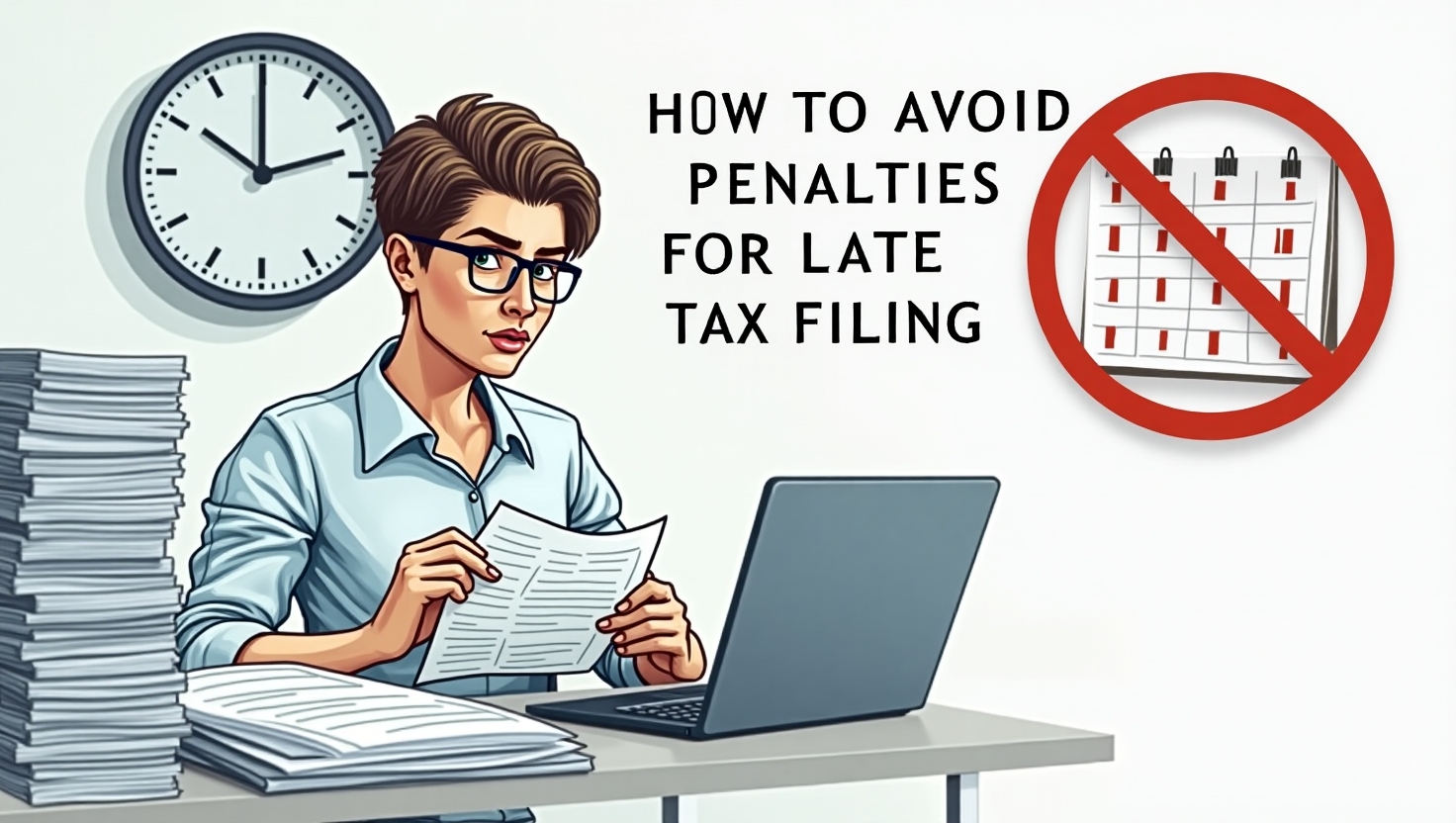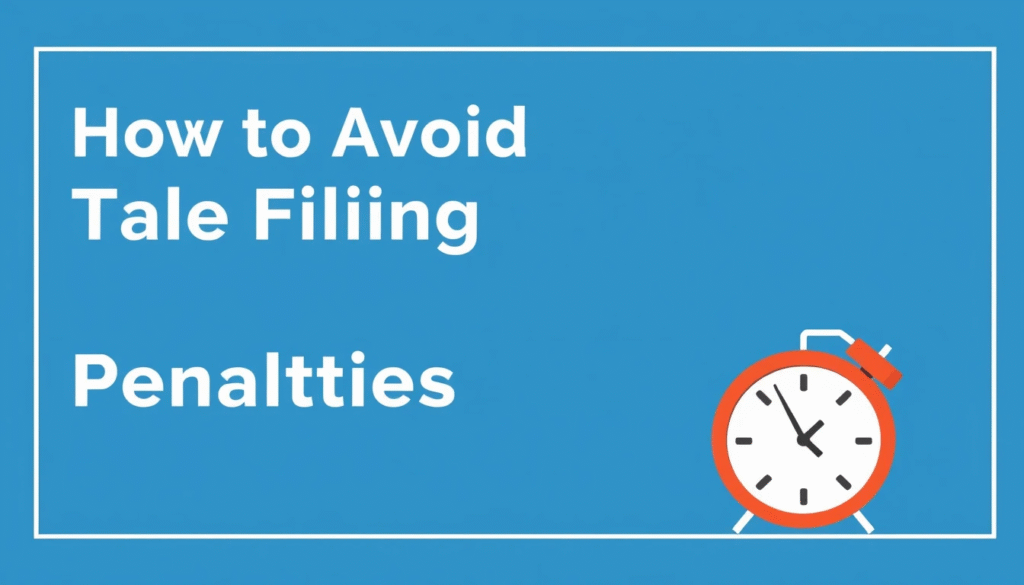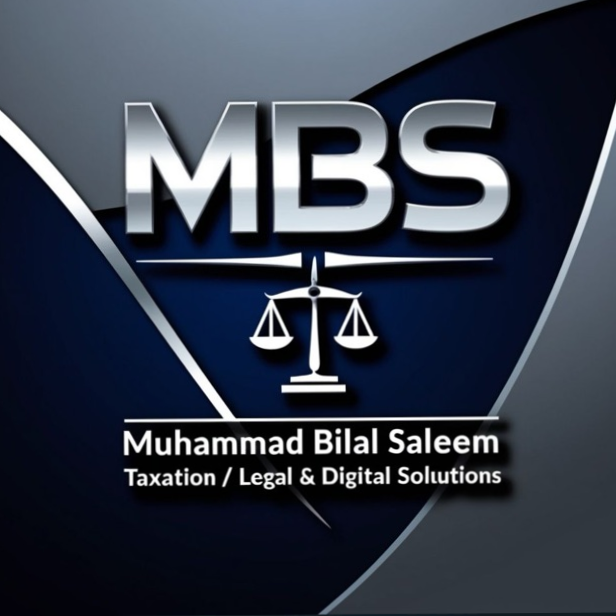
Filing your taxes on time might not be the most exciting part of your year, but it’s one of the most important. A late tax submission can lead to unnecessary penalties, interest charges, and even legal trouble if ignored for too long. The good news is that with a little planning and awareness, you can easily stay ahead of deadlines and avoid the stress that comes with late tax filing.
In this article, we’ll explore why timely tax filing matters, the consequences of filing late, and most importantly, practical steps you can take to avoid penalties all explained in plain language.
Why Filing Taxes on Time Is Important
How to Avoid Penalties for Late Tax Filing

Avoid fines and interest that can eat into your income.
Maintain a clean tax record, which is helpful for business growth, bank loans, or future audits.
Keep your peace of mind, no last minute panic or scrambling for missing documents.
Filing on time isn’t just about avoiding penalties; it’s also about staying organized and building financial discipline.
Think of tax filing as keeping your relationship with the government healthy. When you submit your taxes on time, you:
Avoiding Penalties and Fines
How to Avoid Penalties for Late Tax Filing
How to Avoid Penalties for Late Tax Filing
The government imposes late filing penalties that can significantly increase the amount you owe.
Maintaining a Clean Compliance Record
How to Avoid Penalties for Late Tax Filing
Regular on time filing builds a positive history with tax authorities, which can be useful if you ever apply for loans or need tax clearance.
Preventing Interest Charges
How to Avoid Penalties for Late Tax Filing
In addition to penalties, interest may accrue daily on any unpaid taxes.
Access to Refunds and Tax Benefits
How to Avoid Penalties for Late Tax Filing
Filing late can delay refunds and may even disqualify you from certain deductions or credits.
What Happens If You File Taxes Late?
How to Avoid Penalties for Late Tax Filing

In Pakistan and most countries the tax authority such as the Federal Board of Revenue FBR sets strict deadlines for tax submissions. Missing them can lead to:
Late Filing Penalty
A fixed fine or a percentage of your tax due.
Interest Charges
Daily interest that adds up the longer you delay.
Legal Notices
In severe cases, repeated late filing may attract official investigation.
Missed Refunds or Credits You could lose out on tax refunds or deductions that reduce your liability.
These consequences can add unnecessary pressure to your finances and they’re completely avoidable.
While the exact penalty amounts vary by country, most tax authorities impose two main types of charges:
Late Filing Penalty
A fixed percentage of the unpaid tax amount charged for each day, week, or month you’re late.
Late Payment Interest
Interest applied to the outstanding tax balance, compounding until payment is made.
For example, in Pakistan, the Federal Board of Revenue FBR can charge a minimum penalty amount plus daily interest, while in the US, the IRS can impose up to 5% per month of the unpaid taxes.
Top Reasons People File Taxes Late
How to Avoid Penalties for Late Tax Filing
Understanding why people miss deadlines can help you identify and fix the root cause:
Procrastination Waiting
until the last minute and running out of time.
Complex Finances
Self employed individuals or business owners often have complicated records.
Lack of Documentation
Missing receipts, income statements, or expense records.
Unawareness of Deadlines
Not keeping track of the official tax calendar.
Financial Constraints
Avoiding filing because they cannot pay the tax due.
How to Avoid Late Filing Penalties

How to Avoid Penalties for Late Tax Filing
Here are practical steps you can take to ensure you never miss a tax deadline again:
Mark Your Calendar Early
As soon as tax authorities announce the filing dates, mark them in your physical calendar, phone reminders, or project management tools. Set at least two reminders one a month before and another a week before the deadline.
Organize Financial Records Throughout the Year
Rather than scrambling at the last moment, keep your income and expense documents updated monthly. Use accounting software like QuickBooks, Wave, or Xero to automatically categorize transactions.
Hire a Professional Tax Consultant
How to Avoid Penalties for Late Tax Filing
If your tax situation is complex, working with a certified tax professional can save you time and reduce errors. They can also help you claim all eligible deductions and ensure compliance.
File Even if You Cannot Pay in Full
One of the most common mistakes is avoiding filing because you don’t have the money to pay the tax due. File your return on time and then arrange a payment plan with tax authorities. This can help you avoid the failure-to-file penalty, which is often higher than the failure-to-pay penalty.
Use E Filing Services
How to Avoid Penalties for Late Tax Filing
Most tax authorities now offer secure online filing platforms. E filing is faster, more convenient, and ensures your return is received instantly. You also get an immediate confirmation for your records.
Understand Extensions
Some countries allow you to apply for an extension if you cannot file by the original deadline. However, extensions only apply to filing, not to payment, so any taxes owed should still be paid by the due date.
Stay Updated on Tax Law Changes:
Tax rules and deadlines can change from year to year. Subscribe to your local tax authority’s email alerts or follow their official social media channels to stay informed.
Automate Where Possible
Set up recurring tasks in apps like Google Calendar, Trello, or Asana to remind you of quarterly or annual tax dates. If you’re a business owner, integrate your bank with accounting software for real-time reporting.
Double-Check Before Submission
A large number of late filing penalties occur because a tax return was rejected for errors and not resubmitted in time. Always review your return carefully before submitting.
Keep Proof of Submission
Whether you file online or physically, always keep proof—such as an acknowledgment receipt or digital confirmation—for future reference.
Special Tips for Business Owners
If you’re running a business, avoiding late filing penalties becomes even more important because the fines can be much higher.
File quarterly tax returns if required.
Assign a dedicated staff member or accountant to handle tax matters.
Reconcile your accounts monthly to avoid year-end chaos.
Stay compliant with sales tax, payroll tax, and corporate income tax deadlines.
What to Do If You’ve Already Filed Late
If you’ve already missed the deadline:
File as Soon as Possible
The sooner you file, the less penalty you’ll owe.
Pay What You Can
Even partial payment reduces interest charges.
Request Penalty Abatement
If you have a valid reason such as illness, natural disaster, or other emergencies, you may request a waiver.
Set Up Future Reminders
Learn from the mistake and create a system to avoid it next year.
Conclusion
Late tax filing can cause financial stress, damage your compliance history, and cost you extra money in penalties and interest. The good news is that avoiding these penalties is entirely within your control. By staying organized, using technology, seeking professional help, and filing on time even if you cannot pay immediately—you can keep your tax record clean and protect your finances.
Remember:
Taxes are not just an annual obligation; they’re part of ongoing financial planning. Make them a priority, and your wallet will thank you.
Contact Us:
How to Avoid Penalties for Late Tax Filing
Follow us on social media for updates, tips, and tax humor:
- Facebook: MBS Taxation
- Website: MBS Taxation
- Our Website Contact Form: Click Here
- Whatsapp Number: +923087543324
We’re here to simplify your taxes so you can focus on what matters most—your work, business, and life!
FAQ
How to Avoid Penalties for Late Tax Filing




